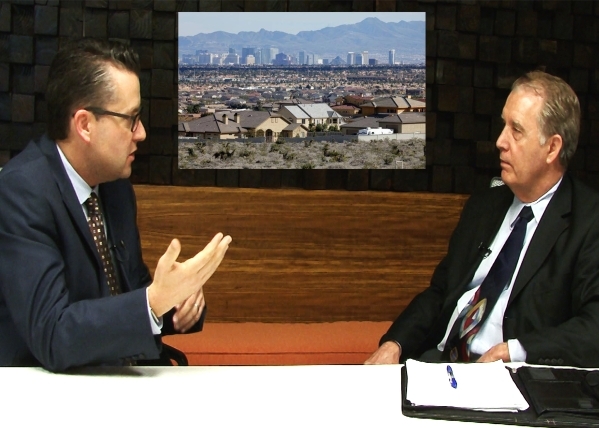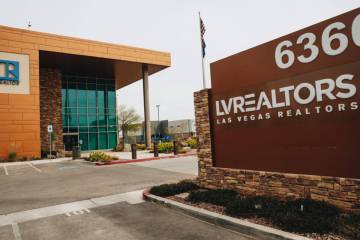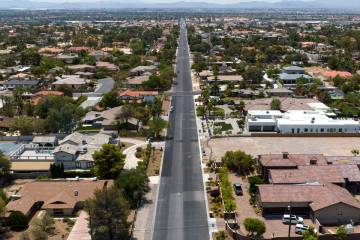Housing analyst Brian Gordon says Vegas is in good shape — VIDEO
Las Vegas real estate is in about the best shape it's been in for a decade, according to a leading Nevada housing analyst, with increasing employment, incomes and migration and lessening distressed homeowners.
Brian Gordon, a principal with Applied Analysis and prime author of Las Vegas Quarterly Market Reports, notes that Southern Nevada ranges from better than other markets to near top of the nation in such important areas as population growth and our ability to attract good — and increasingly diverse — jobs.
And all that portends well for Las Vegas real estate and for people considering buying or selling a home here this year.
Gordon sat down for a wide-ranging conversation on the Las Vegas economy and its effect on the local housing market. A few statistics of note:
• Employment is up about 3 percent year over year, and we're near the top of the nation in overall employment growth. Nevada is fifth among states.
• Incomes are up, and we're leading the nation in private sector wage growth.
• Population growth is up about 2.2 percent for 2015. That's not as much as the state's historical figure of 4 to 5 percent, but it's a reversal from the depths of the recession. About a third of newcomers are from California, where homes are much more expensive, so they're coming here with equity.
"All of that incremental growth in the market supports demand for housing units at the end of the day," Gordon said.
Leading the employment growth for the past year have been jobs in health care and education. Some $13 billion in resort corridor projects begun or announced, plus a rebounding new-home market, have meant 7,500 fairly well-paying construction jobs, he said. A few short years ago, he noted, builders put of 3,500 homes in Las Vegas, half of those constructed in 2015.
While Nevada still leads in the unenviable area of distressed properties, those have dropped from 135,000 — or seven out of 10 — in the depth of the recession to about 35,000 today. That's because the avalanche of foreclosures eventually pushed many under-water buyers out of their homes, but also because prices have climbed, making the properties more valuable again. Also, many homeowners kept paying their mortgages and continue to have the ability to do so, further reducing the likelihood of foreclosure.
"People who have made it this far are likely to remain in those homes and weather the storm," he said.
Speculation that Las Vegas would see a second wave of foreclosures turned out to be overly pessimistic, he said.
What all that means for people thinking of buying or selling a home in Las Vegas is that they should make those decisions based on their own financial and family circumstances, he said, rather than trying to time the market. Home prices in Las Vegas today are "probably better aligned with incomes than they have been for the past decade," Gordon said. "Homes are generally within striking distance for most buyers."
Gordon pointed to a National Association of Realtors survey that said people buying within the past year expected to stay in the home for 15 years.
"So as for trying to time the market — Is it a good time; is it a bad time? It really boils down to is it a good time for you?"
For the past five months, the median resale price has been around $220,000, although that's up about 8 percent year over year.
Those who can't afford the median price have the option of buying condos or townhouses to get started on home ownership, he said, or seek out the more mature areas of Las Vegas where prices are lower.
But don't expect a lot more new "for sale" multifamily housing, he said, as builders in that market are aiming at renters, so they're building apartments.
Summing up, Gordon says potential problems for real estate and the economy in Las Vegas include the high cost and low availability of land and threats to the national — and international — economy.
"We are a tourism-based economy, and what happens outside has potential to affect us," he said. "We've got 150,000 rooms sitting in Las Vegas that we're looking to fill, and we need people from out of town to come in and occupy those hotel rooms."
The many positives include major new employers like the Faraday electric car plant in North Las Vegas and major investments, particularly on the Strip, including a world-class arena, "something we've talked about for decades by is now only happening."
All in all, it's a much steadier and balanced environment than it's been for years, he said.
"From a consumer standpoint …I think we're in a much more stable position than we were at any point during the last decade if you think about the roller coaster — the ups, the downs," Gordon said. "We're now starting to see much more stability — home prices are holding their ground and we're not seeing as much distress. I think that's probably the biggest thing."
Hal DeKeyser is the director of product development for the Las Vegas Review-Journal. Contact him at hdekeyser@reviewjournal.com.

















